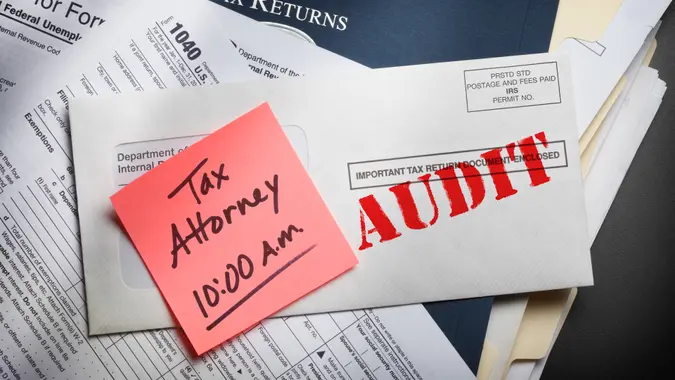How To File Taxes for a Deceased Relative

Commitment to Our Readers
GOBankingRates' editorial team is committed to bringing you unbiased reviews and information. We use data-driven methodologies to evaluate financial products and services - our reviews and ratings are not influenced by advertisers. You can read more about our editorial guidelines and our products and services review methodology.

20 Years
Helping You Live Richer

Reviewed
by Experts

Trusted by
Millions of Readers
Upon a death in the family, there will likely be a number of unpleasant tasks to perform, including filing taxes for deceased loved ones. Because death and taxes are inevitable, there’s a good chance you’ll have to file a decedent’s final federal — and state, if applicable — income tax return in the future.
Find Out: Can You Afford To Die in Your State?
Take Action: 27 Genius Things Retirees Should Do With Their Money Right Now
When you’re the surviving relative of a deceased person, learn the basics of filing taxes for a deceased taxpayer.
Filing the Return of a Deceased Relative
The IRS requires someone to file taxes for the relative who has passed. “A final return can be submitted by the surviving spouse or a personal representative,” said Andrew Oswalt, CPA and tax analyst for TaxAct, a tax preparation software company.
“A personal representative of an estate is an executor of estate, executor of will, administrator or anyone who is in charge of the decedent’s will to administer the estate and distribute properties,” he continued. “An administrator is usually appointed by the probate court if no will exists, if no executor was named in the will or if the named executor cannot or will not serve.” Additionally, when filing taxes for deceased with no estate, an administrator also has to be appointed. The personal representative can also serve as the executor of the decedent’s will.
Who Signs Form 1040 for a Deceased Taxpayer?
When a personal representative prepares a decedent’s tax return, they must write the word “deceased,” the decedent’s name and the date of death across the top of the return — and sign it. When the decedent did not appoint a personal representative, the surviving spouse must sign the return and write “filing as surviving spouse” on it. Sign your name along with your late spouse’s if you’re filing or e-filing income tax using a joint return.
When a deceased taxpayer refund check is due, you might need to file Form 1310 — Statement of a Person Claiming Refund Due a Deceased Taxpayer. Form 1310 isn’t required if a surviving spouse is filing a joint return with the decedent.
See: What Happens to Your Bitcoin When You Die?
How To Figure Out Income and Deductions Time Frame
Filing income tax for a deceased parent is different from filing regular tax returns. You must keep in mind that a decedent’s income is generally counted from the beginning of the year to the day they died. One exception to this is medical bills — to claim those as deductible expenses, the estate must pay them within a year of the decedent’s date of death. These medical expenses cannot be included on Form 706 U.S. Estate Tax Return.
Find Out: Medical Expenses You Can Deduct From Your Taxes
How To Handle Gifts and Inheritances
When you inherit property or money from a deceased person, you might wonder if it will be considered taxable income. Currently, only six states charge an inheritance tax, and inheritance tax exemptions also exist. But upon selling inherited property, you might have to pay taxes on the profits you receive, depending on the basis of inherited property.
How To Handle an Inherited IRA
When you inherit a traditional IRA from someone other than your spouse, you can’t treat the inherited IRA as your own. You must make a trustee-to-trustee transfer to an IRA in the name of the decedent.
Different taxation rules apply to distributions from inherited IRAs if you were married to the decedent. As a late individual’s spouse, you have three options when you inherit an IRA:
- Designate yourself as the account owner.
- Designate yourself as the beneficiary of the IRA.
- Roll it over into a traditional IRA or another qualified plan.
In the event that the decedent invested in a Roth IRA, there are specific rules about distributions, too. Because inheriting an IRA can be tricky tax-wise, consider getting a tax professional’s advice regarding your best option.
Take a Look: Tax Mistakes Everyone Makes — and How To Avoid Them
Filing Taxes for a Deceased Relative With No Estate
Normally, you must file an estate tax return for a decedent, but that varies based on the type of estate. According to the IRS, if the decedent had “relatively simple estates” such as publicly traded securities, small amounts of other easily valued assets, and no special deductions or elections, or jointly held property, you do not need to file an estate tax return.
But in the event that the decedent had an estate that is subject to a tax, there are ways to reduce their estate tax.
Prevent Tax Identity Theft of a Deceased Relative
Criminals often try to steal a decedent’s identity. “The risks are real — deceased persons’ identities are stolen every year,” Oswalt said. “Many death records are public, and many thieves use that information to their advantage.”
To prevent theft of a decedent’s identity, take the following steps outlined by the IRS:
- Omit personal information — such as birth date, address, mother’s maiden name — from the decedent’s obituary.
- Give the IRS death notification by sending it a copy of the death certificate immediately.
- Send copies of the death certificate to the three credit reporting bureaus and instruct them to put a “deceased alert” on the decedent’s credit report.
- Review the deceased’s credit report for any questionable activity.
Related: 7 Signs You’re the Victim of a Tax Scam
Reduce Filing Stress
Filing taxes for deceased relatives and handling other wills and probate obligations can be confusing, time-consuming and unpleasant. Consider enlisting the aid of an accountant or other tax professional to assist you during this stressful time.
- Take Our Poll: Are You Actually Spending Your Child Tax Credit Payment?
- 5 Things Most Americans Don’t Know About Social Security
- Here’s How Much You Need To Earn To Be ‘Rich’ in Every State
- The Hidden Costs of Education at Every Level
Cynthia Measom and Taylor Bell contributed to the reporting for this article.
Last updated: Aug. 20, 2021
 Written by
Written by  Edited by
Edited by 
























